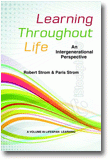
Learning Throughout Life
An Intergenerational Perspective
By:
Robert D. Strom, Arizona State University
Paris S. Strom, Auburn University
A volume in the series: Lifespan Learning. Editor(s): Paris S. Strom, Auburn University. Robert D. Strom, Arizona State University.
Published 2012
The dangers of age segregation and the benefits of age integration are examined. Each generation should be recognized as an essential source for learning. Harmony will increasingly depend on general awareness of how other age groups interpret events, respect for values that guide their behavior, responsiveness to their needs and concerns, consideration of their criticisms and solutions, and acknowledgement of their contributions.
This book describes: (a) personality assets and mental abilities to focus learning at each stage of development; (b) obstacles to anticipate and overcome; (c) a rationale to make reciprocal learning common; (d) research findings which identify generational learning needs; and (e) benefits of providing lifelong education. Six stages are explored: infancy and early childhood (birth-age 6); middle and later childhood (ages 6-10); adolescence (ages 10-20); early adulthood (ages 20-40); middle adulthood (ages 40-60); and older adulthood (age 60+). Some outcomes of lifelong learning include self-control, patience, integrity, resilience, persistence, problem solving ability, acceptance of criticism, and generativity. The intended audiences for this book are professionals working with individuals and families.
CONTENTS
Preface. PART I: INFANCY AND EARLY CHILDHOOD (BIRTH-AGE 6) 1. Language and Socialization. 2. Self-Control and Patience. 3. Reflection and Imagination. 4. Fear and Critical Thinking. PART II: MIDDLE AND LATER CHILDHOOD (AGES 6-10) 5. Television and Social Networks. 6. Thinking and Selective Attention. 7. Integrity and Ethical Standards. PART III: ADOLESCENCE (AGES 10-20) 8. Identity Status and Goals. 9. Team Skills for School and Work. 10. Physical Health and Risks. PART IV: EARLY ADULTHOOD (AGES 20-40) 11. Creative Thinking and Innovation. 12. Resilience and Stress. 13. College and Family Choices. PART V: MIDDLE ADULTHOOD (AGES 40-60) 14. Self-Evaluation and Maturity. 15. Reciprocal Learning and Teaching. 16. Caregivers and Aging Parents. PART VI: OLDER ADULTS (AGE 60+) 17. Grandparents and Generativity. 18. Cognitive Health and Education. 19. Longevity and Identity Change. References.
-
Paperback9781623960469
Web price: $62.04 (Reg. 72.99)
-
Hardcover9781623960476
Web price: $89.24 (Reg. 104.99)
- eBook9781623960483

- EDU032000 - EDUCATION: Leadership
- EDU002000 - EDUCATION: Adult & Continuing Education
- EDU009000 - EDUCATION: Educational Psychology
-
 Adolescents in the Internet Age
A Team Learning and Teaching Perspective Third Edition
Adolescents in the Internet Age
A Team Learning and Teaching Perspective Third Edition
-
 Adolescents In The Internet Age, 2nd Edition
Teaching And Learning From Them
Adolescents In The Internet Age, 2nd Edition
Teaching And Learning From Them
-
 Adult Learning and Relationships
Adult Learning and Relationships
-
 Parenting Young Children
Exploring the Internet, Television, Play, and Reading
Parenting Young Children
Exploring the Internet, Television, Play, and Reading
-
 Polling Student Voices for School Improvement
A Guide for Educational Leaders - 2nd Edition
Polling Student Voices for School Improvement
A Guide for Educational Leaders - 2nd Edition
-
 Polling Students for School Improvement and Reform
Polling Students for School Improvement and Reform
-
 Thinking in Childhood and Adolescence
Thinking in Childhood and Adolescence

